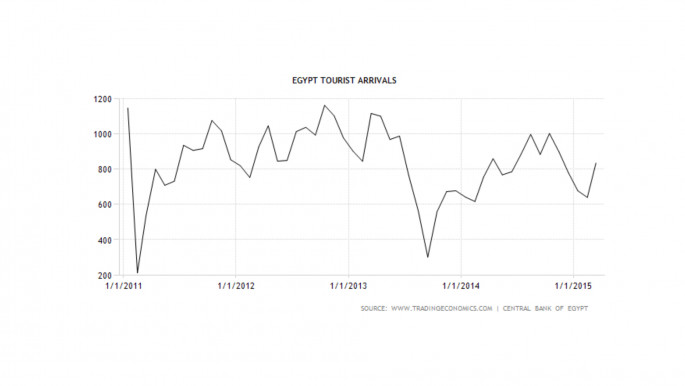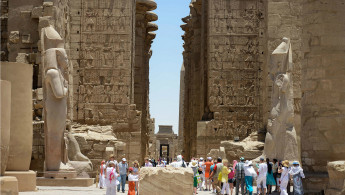Egypt fears for lucrative tourism market
"We have become a target," said Egypt's travel agents association official, Mohammed Othman, following the foiled suicide attack outside the country's tourist hotspot of Karnak in Luxor.
Wednesday's thwarted attack, in which a suicide bomber blew himself up in the car park outside the temple and two gunmen opened fire, has caused panic and anger among many Egyptians.
| Tourism is the mother and father of Luxor Mohammed Othman |
Although no tourists were harmed and the temple was not damaged, the attack has managed to leave a deep cut in the already fragile tourism industry of Egypt, which is its government’s main source of revenue.
"Tourism is the mother and father of Luxor," Othman explained.
In the city and surrounding province of nearly one million people, about 75 percent of them earn their living from tourism, and business had just started to revive after collapsing following Egypt's 2011 uprising.
After the revolution of 2011, the number of tourists tumbled from an all-time high of 14.7 million in 2010 to just over nine million.
Continuous turmoil kept figures low, and then a new blow came with the unrest surrounding the military's removal in July 2013 of Mohamed Morsi from the presidency.
Since then, militants in Sinai have stepped up a campaign of violence. After months of focusing on security forces, attacks then increasingly began targeting government installations and services in the capital.
Egyptian authorities spent the past year trying to win back their lost tourists, paying for glossy billboards and bus-side adverts across London and other European capitals, reportedly at an annual cost of $40 million for a period of three years.
The attempts paid off. In late 2014, the numbers began to improve with tourists visiting beach resorts along the Red Sea.
Figures increased further this year from 640,000 in February to 835,000 in March.
 |
|
| Egypt Tourist Arrivals between 2011-2015 |
In February, the Hisham Zaazou said that the tourism sector "is moving towards recovery" adding that the government was targeting a 20 percent growth in tourist numbers.
But sites with antiquities like Luxor and Cairo still continue to suffer immensely.
A day after the attack, tour operators organised a free day-trip to Luxor for more than 1,000 foreign sightseers brought from a Red Sea resort to bolster the city's spirit and show that it was still a safe and attractive destination.
The tourism, antiquities, security ministers and the prime minister flew to the southern city to reassure locals and foreigners that the security situation is under control.
Nasser Hussein, a tour operator in Luxor who works with British tourist companies, said that with things picking up in 2015, he had started to make plans for 2016 - something that would have been unthinkable last year.
"Things were beginning to move," Hussein said. "But now it looks like it is coming to a halt again."
"We have a saying that tourism gets sick but doesn't die" Hussein continued. "After what happened, we hope it only gets a little sicker but doesn't die altogether."


![President Pezeshkian has denounced Israel's attacks on Lebanon [Getty]](/sites/default/files/styles/image_684x385/public/2173482924.jpeg?h=a5f2f23a&itok=q3evVtko)



 Follow the Middle East's top stories in English at The New Arab on Google News
Follow the Middle East's top stories in English at The New Arab on Google News


